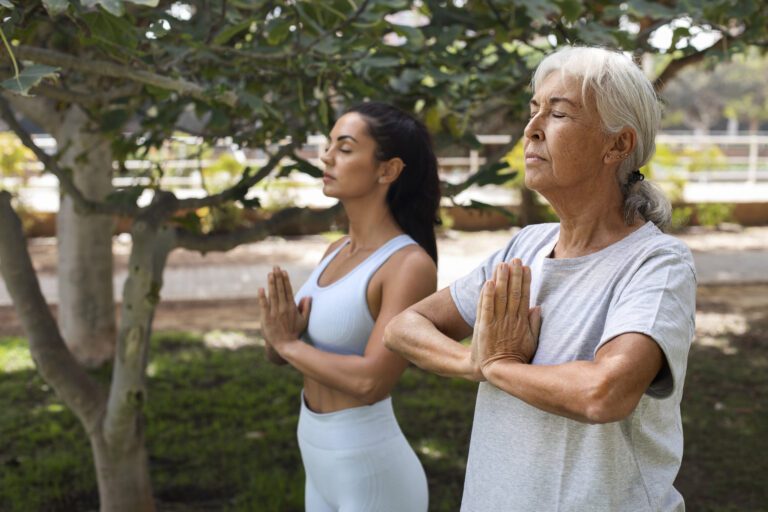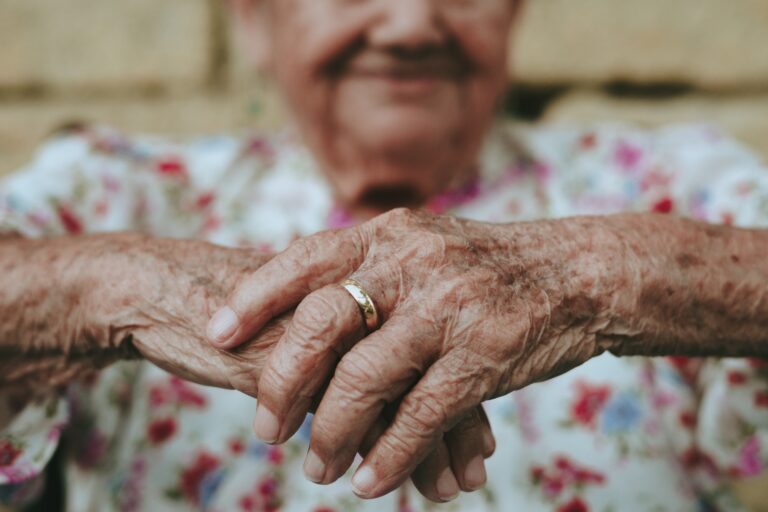The changing seasons play a significant role in influencing the mental and emotional well-being of seniors. In this blog post, we will delve into the intricate ways seasonal transitions impact older adults and explore the significance of mindfulness techniques in fostering mental resilience during these times of change.
Impact on Mental Health
As the seasons shift, seniors often find themselves confronted with various challenges that can affect their mental health.
- Reduced Daylight: The transition to shorter days during the fall and winter can bring forth Seasonal Affective Disorder (SAD). This reduction in daylight exposure can disrupt the body’s internal clock, affecting the production of essential neurotransmitters like melatonin and serotonin, which play a significant role in influencing mood and sleep patterns. Seniors, due to potential existing health conditions or reduced mobility, might find it challenging to spend time outdoors, thereby impacting their exposure to natural light.
- Weather Fluctuations: Drastic changes in weather, such as extreme cold, storms, or prolonged periods of gloomy weather, can substantially influence the mental well-being of seniors. Being confined indoors due to inclement weather can exacerbate feelings of isolation, intensify loneliness, and potentially contribute to depression. Furthermore, for seniors with specific health conditions like arthritis, the colder weather might intensify discomfort or pain, leading to a decline in mental health.
- Holiday Stresses: While the holiday season is often seen as a time of joy and celebration, it can also bring about stress, anxiety, and feelings of loneliness, particularly for seniors. Many seniors experience grief due to the loss of loved ones or feel isolated if they are unable to engage in activities as they once did. Additionally, financial concerns related to gift-giving and social pressures can contribute to stress during this time.
These factors can exacerbate existing mental health conditions or contribute to the onset of new challenges among seniors, who might have a smaller support network, especially if they are living alone or have limited access to family or friends. Such circumstances can intensify the impact of seasonal changes on their mental health.
Strategies to Mitigate Effects
To combat these challenges and mitigate their impact on mental health, several effective strategies can be employed:
- Light Therapy: Utilizing lightboxes that simulate natural sunlight can help alleviate symptoms of SAD by regulating the body’s internal clock.
- Regular Exercise: Encouraging physical activity not only supports overall health but also aids in stress reduction, mood improvement, and enhanced well-being.
- Social Support: Facilitating social engagement through community programs, senior centers, or ensuring regular check-ins from family and friends can significantly combat feelings of isolation.
- Healthy Habits: Ensuring a balanced diet, sufficient sleep, and managing stress through relaxation techniques can contribute significantly to supporting mental health.
- Professional Support: Seeking help from mental health professionals or participating in support groups can equip seniors with essential tools to manage their mental health during these challenging seasonal transitions.
The Role of Practicing Mindfulness for Seniors
Mindfulness practices have been proven to offer a plethora of benefits for seniors, particularly in terms of stress reduction, mood enhancement, and overall mental health improvement. Scientific research highlights several positive effects of mindfulness on the well-being of older adults:
- Stress Reduction: Mindfulness-based practices, such as meditation and deep breathing exercises, have demonstrated a remarkable ability to significantly reduce stress levels in seniors. Research indicates that these techniques can lower cortisol levels, the primary stress hormone, leading to reduced stress and anxiety.
- Improved Mood: Regular engagement in mindfulness practices has been associated with improved mood and emotional well-being among seniors. Studies suggest that consistent mindfulness meditation can alleviate symptoms of depression and enhance overall feelings of well-being and happiness.
- Enhanced Mental Health: Mindfulness techniques play a pivotal role in contributing to better mental health for seniors. Research has indicated that these practices may assist in managing various mental health conditions, including anxiety disorders and cognitive decline. Engaging in mindfulness has been associated with improved cognitive function and better overall mental health outcomes.
- Coping with Age-Related Challenges: Seniors often face numerous age-related challenges, such as chronic pain, sleep disturbances, and feelings of loneliness. Mindfulness practices have been found to assist in coping with these challenges. For example, mindfulness-based stress reduction (MBSR) techniques have shown to aid in managing chronic pain and improving sleep quality in older adults.
- Enhanced Overall Well-being: Engaging in regular mindfulness activities fosters a heightened sense of overall well-being among seniors. It encourages a sense of presence, self-awareness, and self-compassion, thereby promoting a positive outlook on life.
Scientific evidence supporting these positive effects of mindfulness continues to grow. Research conducted with older adults has shown structural changes in the brain associated with mindfulness practice. Studies employing brain imaging techniques like MRI have demonstrated that mindfulness meditation can lead to increased gray matter in brain regions associated with memory, emotional regulation, and self-awareness.
Additionally, various clinical trials and longitudinal studies have been conducted, demonstrating the efficacy of mindfulness-based interventions in improving the mental health and well-being of older adults. These studies often utilize mindfulness-based programs such as Mindfulness-Based Stress Reduction (MBSR) and Mindfulness-Based Cognitive Therapy (MBCT), showing significant reductions in stress, improvements in mood, and overall mental health.
Furthermore, these mindfulness programs have been integrated into various healthcare settings for seniors, such as nursing homes, senior centers, and community programs, demonstrating practical benefits in real-world scenarios.
Mindfulness Techniques for Seniors
Seniors can benefit from a range of mindfulness exercises to support their mental well-being:
- Breathing Exercises: Techniques such as deep abdominal breathing and the 4-7-8 breathing technique can aid in relaxation and stress reduction.
Deep Abdominal Breathing
- Find a comfortable seated position or lie down on your back.
- Place one hand on your chest and the other on your abdomen.
- Inhale slowly and deeply through your nose, allowing your abdomen to rise while keeping your chest relatively still.
- Exhale slowly through your mouth, feeling your abdomen fall.
- Focus on the sensation of the breath, the rise and fall of your belly. Repeat for several minutes, aiming for a calm and steady breath.
4-7-8 Breathing Technique
- Sit comfortably or lie down in a relaxed position.
- Inhale quietly through your nose for a count of 4.
- Hold your breath for a count of 7.
- Exhale audibly through your mouth for a count of 8.
- Repeat this cycle at least 4 times, allowing your body to relax with each breath.
- Body Scan Meditation: This technique allows seniors to relax their entire body by focusing on each body part and consciously releasing tension.
- Sit in a comfortable chair or lie down in a quiet place.
- Close your eyes and bring your attention to your feet. Notice any sensations or tension in this area. Inhale deeply and as you exhale, imagine the tension leaving your feet.
- Gradually move your focus up through your body, spending a few breaths on each part, releasing tension as you go. Ankles, legs, hips, abdomen, chest, shoulders, arms, neck, and head.
- Pay attention to each part and consciously relax any areas of tension. This technique helps to promote relaxation throughout the body.
- Loving-Kindness Meditation: Focusing on sending positive intentions and well-wishes to oneself and others can promote feelings of compassion and positivity.
- Find a comfortable seated position or lie down.
- Begin by focusing on your breath for a few moments.
- Picture someone you love or care for deeply. Silently send them well-wishes. For example: “May you be happy, may you be healthy, may you be at peace.”
- Gradually extend these well-wishes to yourself, then to others, such as friends, family, and even those you might find challenging.
- Conclude by sending these positive intentions to all living beings.
It’s important for seniors to perform these exercises at their own pace and comfort level, gradually increasing the duration and frequency as they become more accustomed to the practices. Regular engagement with these mindfulness exercises can significantly contribute to stress reduction and relaxation.
Connection with Nature
Connecting with nature provides an array of mental health benefits for seniors:
- Stress Reduction: Spending time in natural settings has been proven to significantly lower stress levels among seniors. The serene and peaceful environment of nature can help reduce cortisol levels, consequently reducing stress and anxiety.
- Improved Mood and Mental Health: Interacting with nature, surrounded by green spaces, fresh air, and natural light, has shown to boost feelings of happiness, decrease symptoms of depression, and enhance overall well-being among seniors.
- Enhanced Cognitive Function: Engaging in nature walks or outdoor activities can lead to improvements in attention, memory, and problem-solving skills. This is particularly beneficial for cognitive health in older adults.
Various activities can facilitate seniors in engaging with nature:
- Nature Walks: Encourage seniors to take leisurely walks in nearby parks, nature trails, or botanical gardens to immerse themselves in the natural surroundings while getting gentle exercise. Even just sitting outdoors, watching people and animals, feeling the sun or breeze, will have the same positive effects of connecting with nature.
- Gardening: Participating in gardening activities, such as planting flowers or vegetables, can be therapeutic and provide a sense of accomplishment. Seniors can tend to plants in their own garden or partake in community gardens. Seniors can also garden on their countertops, either growing new plants or veggies, or regrowing from vegetable scraps. There are many resources available to learn how to do this, which will save money for the seniors, as well.
- Birdwatching: Providing seniors with bird identification guides and binoculars to observe various bird species in their natural habitats can be an engaging and relaxing activity. Having a friend or family member participate is a great way to socialize through a shared interest.
- Nature Photography: Giving seniors an opportunity to capture the beauty of nature through photography can be a creative and rewarding way to connect with the natural world. Nature photography can be as simple as sitting in one place and taking pictures of the things you see, or taking a walk, even in your local neighborhood and finding interesting things. You would be surprised by some things you might find.
- Outdoor Meditation or Yoga: Encourage seniors to practice meditation or gentle yoga in a natural setting to combine the benefits of mindfulness with the calming effects of nature.
- Picnics or Outdoor Group Activities: Organizing group outings to natural spaces, such as picnics or outdoor group exercises, can enhance the overall experience through social interaction combined with exposure to nature.
By incorporating these activities into their routine, seniors can experience numerous mental health benefits, leading to improved emotional well-being and a greater sense of vitality and connection with the world around them.
Gratitude Journaling
Keeping a gratitude journal is an excellent daily practice, particularly for seniors, to foster a positive mindset and appreciation for the present moment. It can significantly enhance mental and emotional well-being. Here’s how seniors can benefit from and start a gratitude journal:
- Promotes Positivity: Writing about things one is grateful for shifts the focus towards positive aspects of life. Seniors can reflect on even the smallest positive things, which can boost mood and overall outlook.
- Enhances Mindfulness: The practice of keeping a gratitude journal encourages mindfulness and being present in the moment. It allows seniors to pay attention to the good things happening around them daily.
- Reduces Stress: Reflecting on positive experiences and things to be grateful for can reduce stress and anxiety, promoting a more relaxed state of mind.
Here’s how seniors can start a gratitude journal:
- Set a Routine: Designate a specific time each day to write in the gratitude journal. It could be in the morning, reflecting on the day ahead, or at night, reflecting on the day’s events.
- Choose a Format: Seniors can use a physical journal, a notebook, or digital platforms to document their thoughts. They should choose a format that is comfortable and accessible.
- Write Three Things: Encourage seniors to write down at least three things they are grateful for each day. These could be simple things, such as a pleasant interaction, a beautiful moment in nature, or the comfort of a good meal.
- Reflect and Elaborate: Encourage them to reflect on why they are grateful for each item. Elaborating on the reasons amplifies the positive impact.
- Consistency is Key: Encourage seniors to be consistent. The more they engage with the practice, the more they’ll notice positive changes in their mindset and overall well-being.
- Encourage Self-Compassion: Remind seniors that it’s okay if some days are challenging or if they struggle to find something to write. The practice is about the process, and not every day needs to be filled with profound gratitude.
By practicing gratitude and keeping a journal, seniors can cultivate a more positive and appreciative mindset, leading to improved emotional health and a greater sense of contentment in their daily lives.
Experience: There is a wonderful project that was a big hit in the independent living community I worked at called ‘These Hands’. Although it is not journaling, this is a wonderful way to reflect on the seniors’ life and encourage the creativity of writing. The senior simply writes about the things their hands have accomplished over the years. For example, ‘These hands have raised children’, ‘These hands have endured war’, ‘These hands have baked many cakes’, ‘These hands have played with grandchildren and great grandchildren’. These statements can be very general or very specific. They can be written as statements or into a poem. You then take a picture of the seniors hands and display the image with the written piece. It is such a beautiful way for the seniors to remember as well as for the family to learn about their loved ones life.
Mindful Movement: Yoga and Tai Chi
Yoga and Tai Chi are excellent forms of gentle exercise that promote mindfulness in movement and offer numerous benefits for seniors, including enhancing balance, flexibility, and mental clarity. Please remember that any exercise can be adapted to meet the physical abilities of the seniors, including doing seated exercises. YouTube is a great resource for finding videos of adapted exercises. Here’s how these activities can be beneficial:
Yoga for Seniors:
Yoga is a practice that combines physical postures, breathing exercises, and meditation, promoting a mind-body connection. For seniors, it offers:
- Improved Flexibility: Yoga involves various poses and stretches that can help improve flexibility and mobility, reducing stiffness in joints.
- Enhanced Balance: Many yoga poses focus on balance and stability, which can be particularly beneficial for seniors in preventing falls and improving coordination.
- Mental Clarity and Relaxation: The focus on breathing and mindfulness in yoga helps seniors achieve mental clarity, reduce stress, and promote relaxation.
Tai Chi for Seniors:
Tai Chi is a Chinese martial art that involves slow, flowing movements and deep breathing. It’s particularly beneficial for seniors due to its gentle and low-impact nature:
- Balance Improvement: The slow, deliberate movements in Tai Chi help strengthen muscles and improve balance, which is crucial in preventing falls.
- Flexibility and Joint Health: Tai Chi’s movements involve gentle stretches and rotations, which can enhance flexibility and promote joint health.
- Mental Clarity and Relaxation: Similar to yoga, Tai Chi emphasizes mindfulness, aiding in mental clarity, reducing stress, and promoting relaxation.
Tips for Seniors Practicing Yoga or Tai Chi:
- Start Slowly: Seniors should begin with beginner or gentle classes to adapt to the movements and avoid strain.
- Use Props if Necessary: Yoga props (blocks, straps) or modifications in Tai Chi can help adapt movements for individual needs.
- Mindfulness in Movement: Encourage seniors to focus on their breath and be mindful of each movement, paying attention to the sensations in their body.
- Consistency: Regular practice is key to reaping the benefits. Seniors should aim for consistent practice rather than pushing too hard in any single session.
- Consult with a Physician: Before starting any new exercise regimen, seniors should consult their healthcare provider, especially if they have any health concerns.
Both yoga and Tai Chi can significantly improve the physical and mental well-being of seniors. Encouraging them to participate in these practices in a safe and comfortable environment can greatly contribute to their overall health and quality of life.
Practical Tips to Cope with Seasonal Changes
To help seniors better cope with the challenges that seasonal changes bring, it is essential to address their physical, emotional, and environmental needs:
- Physical Health:
- Encourage seniors to dress in layers and wear appropriate clothing for changing weather conditions to ensure they stay comfortable.
- Suggest indoor exercises or activities like yoga, stretching, or dancing to maintain physical activity when outdoor activities are limited.
- Ensure seniors have access to nutritious meals, including seasonal fruits and vegetables, and encourage adequate hydration even in cooler weather.
- Seniors should ensure they have necessary medications and regular check-ups to manage chronic conditions, especially during seasonal changes when health needs may shift.
- Emotional and Mental Well-being:
- Encourage seniors to maintain social connections through in-person meetups, phone calls, or video chats, as staying connected with friends and family is vital for emotional well-being.
- Even during colder seasons, exposure to natural light and fresh air can be beneficial. Encourage short walks or sitting by a sunny window to get some natural light.
- Participation in hobbies or activities they enjoy can help combat feelings of isolation and boost mood.
- Practicing mindfulness techniques, relaxation exercises, or meditation can aid in coping with the emotional changes that seasonal shifts may bring.
- Home Safety:
- Make sure their living space is adequately heated or cooled according to seasonal needs. Regularly check for drafts, install handrails, and ensure proper lighting to prevent accidents.
- In areas prone to extreme weather, such as heavy snow or storms, ensure seniors are prepared with emergency kits and plans.
- Regular maintenance of heating systems, water heaters, and smoke detectors is crucial to ensure a safe and comfortable living environment.
- As winter may bring slippery conditions, ensure seniors have appropriate footwear and assistive devices to prevent falls.
- Seeking Professional Help:
- Encourage seniors to seek professional help if they experience persistent feelings of sadness, anxiety, or stress during seasonal changes. Mental health professionals can provide support and guidance.
In conclusion, seasonal changes can significantly impact the mental and emotional well-being of seniors. Mindfulness practices, such as meditation and deep breathing, along with activities that connect them with nature and mindful movement through yoga and Tai Chi, offer effective ways to navigate these challenges. Encouraging seniors to maintain social connections, ensure physical well-being, and seek professional help when needed are also vital in promoting their overall mental resilience. By incorporating these strategies, we can better support seniors in coping with the emotional and physical effects of seasonal transitions, improving their well-being as they age.
📸 Image by Freepik


From a young age, Stacey’s link to the senior care industry grew alongside her mother’s work at a nursing home, where she often accompanied her. By her early teens, she secured her first official job at a nursing home, laying the foundation for a profound journey in senior care spanning over four decades. Her roles varied from opening assisted living and memory care residences to working in nursing homes and independent senior living communities. As the former Director of Fun for 300 independent seniors, she expertly organized daily events and trips. Stacey’s unwavering passion, nurtured by her family, and professional dedication as a recreation therapist, reflect her deep commitment to preserving the dignity and well-being of seniors.
Stacey’s senior care expertise has been recognized by the media including U.S. News and World Report and Care.com.
Stacey and her husband Bryan are the owners of the senior in-home care agency A Place At Home – North Austin.




